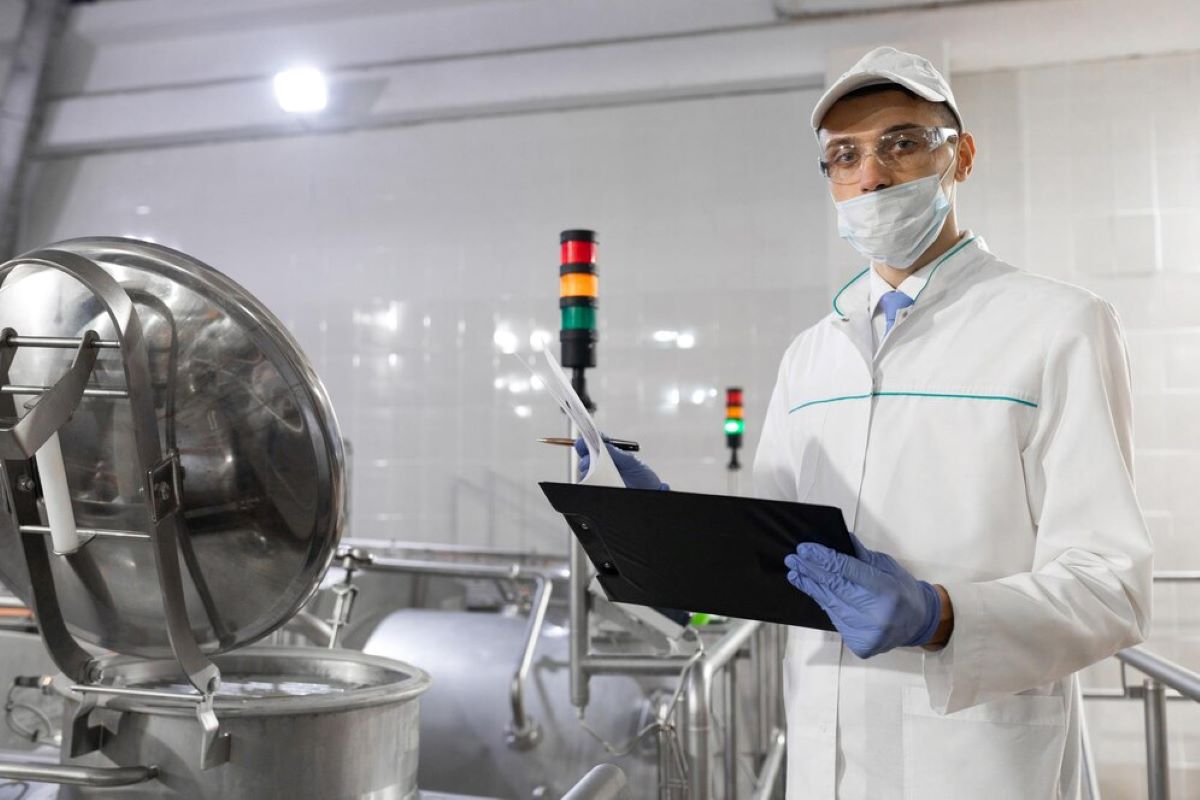The Importance of Food Safety Inspections
Food safety inspections are crucial for protecting public health. They prevent foodborne illnesses and ensure that food establishments maintain high safety standards. These inspections involve a thorough assessment of how food is handled, stored, and how clean the facilities are.
Why Are Regular Inspections Necessary?
Regular inspections play a vital role in identifying potential health risks:
- Risks of cross-contamination
- Problems with temperature control
- Poor personal hygiene practices
- Inadequate cleaning procedures
- Infestations of pests
The Role of Compliance in Food Establishments
Following food safety regulatory compliance is essential for running a successful food business. It shows a commitment to:
“Protecting public health by consistently following food safety standards and regulations”
Food establishments must meet specific requirements:
- Temperature Control: Ensuring proper storage and cooking temperatures
- Sanitation: Implementing regular cleaning and sanitising protocols
- Staff Training: Providing ongoing education in food safety practices
- Documentation: Keeping accurate records of safety procedures
- Facility Maintenance: Maintaining equipment and infrastructure
These requirements are the foundation of food safety inspections. They hold establishments accountable and ensure they fulfil their responsibilities towards public health. Successful inspections demonstrate an establishment’s dedication to food safety, earning the trust of customers and regulatory authorities.
The Benefits of Regular Inspections
Regular inspections also offer opportunities for improvement. They help establishments identify areas that need attention before they become serious problems. This proactive approach strengthens food safety practices and supports long-term compliance success.
Understanding Key Areas Inspectors Focus On
Food safety inspectors conduct thorough assessments across multiple critical areas to ensure establishments meet regulatory requirements. Each inspection zone plays a vital role in maintaining food safety standards and protecting public health.
Food Storage Practices
- Temperature control monitoring for refrigerated and frozen items
- Proper storage containers and protective coverings
- Clear separation of raw and ready-to-eat foods
- Stock rotation and date labelling systems
Employee Hygiene Standards
- Hand washing facilities and sanitising stations
- Clean, appropriate protective clothing
- Health screening protocols
- Personal hygiene practices
Safe Food Handling
- Cross-contamination prevention measures
- Cooking and cooling temperature controls
- Safe thawing procedures
- Food preparation surface sanitisation
Cleaning and Sanitation Protocols
- Documented cleaning schedules
- Appropriate chemical storage
- Equipment maintenance records
- Sanitisation verification methods
Waste Management Systems
- Sealed waste containers
- Regular disposal schedules
- Recycling procedures
- Clean waste storage areas
Pest Control Measures
- Prevention strategies
- Regular monitoring programmes
- Professional pest control records
- Building maintenance to prevent pest entry
Documentation Requirements
- Temperature logs
- Cleaning records
- Staff training certificates
- Incident reports
- Supplier documentation
Each inspection area requires specific attention to detail and consistent monitoring. Regular internal audits of these key areas help maintain high standards and ensure readiness for official inspections. Staff training programmes should address each of these aspects, creating a culture of food safety awareness throughout the establishment.
Implementing robust systems for each inspection area strengthens an establishment’s compliance position and demonstrates commitment to food safety excellence. Digital monitoring tools can streamline record-keeping processes and provide real-time insights into compliance status across all key inspection areas.
Preparation Strategies for Successful Inspections
Proactive preparation is the key to successful food safety inspections. A systematic approach to being ready for compliance includes several important parts that food establishments must put into action.
Daily Operations Management
Cleaning Schedule Implementation
- Create detailed cleaning rosters with specific tasks
- Document cleaning activities with time stamps
- Assign responsibility for different cleaning zones
- Maintain sanitisation logs for high-risk areas
Equipment Maintenance Protocol
- Schedule regular equipment calibration
- Keep maintenance records updated
- Document repair histories
- Perform daily equipment safety checks
Staff Development Programme
Training Requirements:
- Food handling certification
- Personal hygiene protocols
- Cross-contamination prevention
- Temperature control procedures
- Allergen management
- Emergency response procedures
Documentation Management:
- Employee training records
- Temperature monitoring logs
- Cleaning verification sheets
- Pest control reports
- Supplier certificates
- Food storage records
Communication Infrastructure
Strong communication channels create a foundation for consistent compliance:
Internal Communications
- Daily pre-shift briefings
- Weekly team meetings
- Digital notification systems
- Clear reporting hierarchies
External Communications
- Supplier verification procedures
- Health department correspondence
- Customer feedback management
- Incident reporting protocols

Compliance Checklist System
Implementing a structured checklist system helps track compliance:
- Opening Procedures
- Temperature checks
- Equipment inspection
- Storage area assessment
- Mid-Service Checks
- Food temperature monitoring
- Sanitisation verification
- Cross-contamination prevention
- Closing Procedures
- Cleaning verification
- Waste management
- Storage condition confirmation
These preparation strategies create a strong framework for maintaining consistent compliance standards. Regularly putting these practices into action builds confidence in food safety protocols while establishing a culture of continuous improvement within the establishment.
Incorporating the HACCP principles into daily operations can significantly enhance food safety measures. Moreover, following the guidelines outlined in this safety regulation document can further strengthen compliance efforts.
It’s also crucial to adhere to the standards set by the Codex Alimentarius, which provides internationally recognized standards and guidelines for food safety and quality.
Addressing Violations and Continuous Improvement in Compliance
Swift action following inspection violations is crucial for effective food safety management. A systematic approach to addressing violations helps establishments maintain compliance standards and prevent future issues.
Immediate Response Protocol:
- Document all violations in detail
- Photograph areas requiring attention
- Schedule emergency staff meeting
- Create timestamped records of corrective actions
Action Plan Development:
- Prioritise violations based on risk level
- Set specific deadlines for each correction
- Assign responsible staff members
- Allocate necessary resources
- Establish monitoring procedures
Staff Engagement Strategies:
- Create dedicated compliance teams
- Implement daily violation prevention checklists
- Schedule regular training updates
- Reward proactive safety measures
Continuous Improvement Measures:
- Review inspection reports quarterly
- Track recurring issues
- Update standard operating procedures
- Conduct internal mock inspections
The integration of staff feedback proves invaluable in strengthening compliance protocols. Regular team meetings provide opportunities to discuss challenges, share best practices, and refine procedures. Staff members working directly with food preparation and service often identify potential issues before they become violations.
A robust violation response system paired with active staff participation creates a culture of accountability. This collaborative approach transforms inspection findings into opportunities for operational enhancement and strengthened food safety practices.
Moreover, fostering a supportive environment that values mental well-being can significantly enhance staff engagement and performance. As highlighted in this whitepaper, understanding the mental health aspects can lead to better compliance outcomes, as employees are more likely to adhere to safety protocols when they feel supported and valued in their work environment.
Additional Considerations for Wholesale Food Operations and Retail Stores
Wholesale food operations have specific regulatory requirements that go beyond basic food safety rules. These businesses must stay registered with local food safety authorities and have regular inspections of their facilities.
Essential Registration Requirements:
- Valid business registration documentation
- Food handling certificates for key personnel
- Import/export licenses where applicable
- Updated supplier verification records
- Product traceability documentation
Facility Cleanliness Standards:
- Dedicated cleaning zones for different food categories
- Temperature-controlled storage areas
- Proper ventilation systems
- Pest control measures
- Waste management protocols
Retail stores face unique challenges that directly impact their reputation and customer trust. Recent studies show that 78% of consumers check food safety ratings before choosing where to shop.
Common Retail Store Deficiencies:
- Inadequate temperature monitoring
- Improper food storage practices
- Cross-contamination risks
- Expired product display
- Poor stock rotation
These establishments must maintain rigorous cleaning schedules, conduct regular staff training, and implement robust food safety management systems, such as those outlined in the HACCP guidelines. A single failed inspection can result in significant revenue loss and damaged brand reputation, with negative reviews spreading rapidly through social media and review platforms.
The implementation of digital compliance tools helps wholesale operations and retail stores track, monitor, and maintain these essential requirements while ensuring consistent adherence to food safety standards. This includes following harmonized standards for various food activities to ensure quality and safety.
Squizify: A Comprehensive Compliance Solution for Food Establishments
Food establishments seeking to streamline their compliance processes can benefit from Squizify’s innovative digital platform. This comprehensive software solution transforms traditional food safety management into an efficient, automated system accessible through internet-connected devices.
Key Features:
- Customisable digital checklists
- Automated record-keeping capabilities
- Real-time temperature monitoring sensors
- Food label printing integration
- Freight temperature tracking
- Detailed auditing tools
The platform’s secure SaaS infrastructure ensures 24/7 data accessibility, enabling food establishments to maintain accurate records and respond promptly to compliance requirements.

Industry Applications:
- Hospitality venues
- Healthcare facilities
- Aged care centres
- Childcare establishments
- Supermarket chains
- Fuel site convenience stores
- Manufacturing facilities
Squizify’s tailored approach begins with discovery calls and personalised demo sessions to align the software with specific operational needs. The platform’s automated record-keeping eliminates manual paperwork, reducing human error and saving valuable time.
Business Benefits:
- Time and cost reduction through automation
- Enhanced operational efficiency
- Improved compliance accuracy
- Simplified audit preparation
- Real-time monitoring capabilities
- Comprehensive data analytics
The platform’s dedicated support system includes 24/7 live chat assistance, ensuring users can access help whenever needed. Through its user-friendly interface, Squizify empowers staff to maintain consistent compliance standards while focusing on their core responsibilities.
Conclusion
Thorough preparation for food safety inspections is essential for protecting public health. By taking a proactive approach to compliance, you can establish a strong foundation for food safety and earn the trust of regulatory authorities.
Implementing systematic preparation strategies will bring you several benefits:
- Consistent adherence to food safety standards
- Enhanced operational efficiency
- Reduced risk of violations
- Strengthened staff confidence
- Protected brand reputation
Food establishments that prioritise comprehensive compliance measures not only create safer environments for their customers but also for their staff. By integrating modern solutions like Squizify, maintaining meticulous records, and providing regular training to employees, businesses can set themselves up for success during inspections.
These preparation strategies go beyond simply meeting regulatory requirements; they can also give you a competitive edge in the industry. Every step you take towards improving compliance contributes to the larger goal of protecting public health and promoting excellence within your field. If you want to feel more confident during inspections, start by committing to these essential practices.
More to Read : Tools for Achieving HACCP Audit Success

